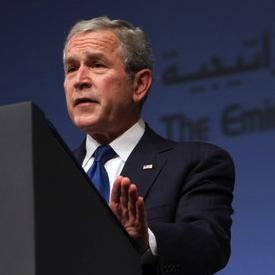It is, perhaps, surprising how much President George W. Bush has talked about democracy and freedom in the Middle East. Last weekend in Abu Dhabi, he delivered his third speech dedicated largely to that topic, which is three more than any previous U.S. president. Bush's dedication to the theme of freedom in the Middle East is genuine. In his formulation, appreciation for the rights of the individual in the Middle East would expand liberty, undermine extremism, and enhance the security of Americans, Arabs, and others. As the president has seen things, Middle Eastern governments have been the obstacles to realizing this vision. He told an audience at the National Endowment for Democracy in 2003 that regional governments had to "serve the true interests of their nations" and give their people the "responsible leadership" that they deserve. He called on governments to lead their people toward democracy, and promised that the United States would not stand by passively in this regard. Bush's ringing charge was this: "Sixty years of Western nations excusing and accommodating the lack of freedom in the Middle East did nothing to make us safe -- because in the long run, stability cannot be purchased at the expense of liberty." In a world with weapons of mass destruction, he said, "It would be reckless to accept the status quo."
Bush and the Middle East: Freedom Agenda, Take Three

